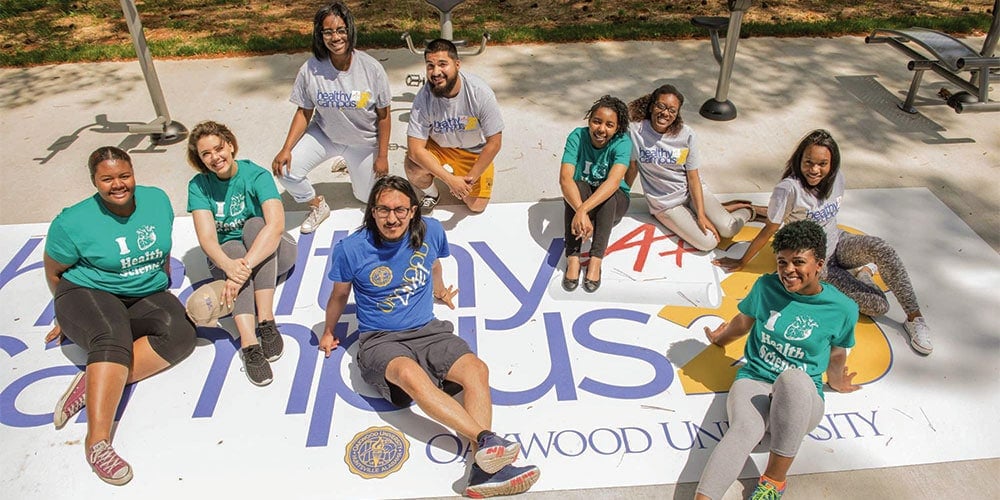
In March 2019 the Partnership for a Healthier America recognized Oakwood University (OU) with its Crystal Apple Award for building its Healthy Campus 2020 (HC2020) campus wellness program.1 The journey began in 2013 when former U.S. Surgeon General Regina Benjamin commented to OU president Leslie N. Pollard that Oakwood is a healthy campus because it has been smoke-free since its founding in 1896.
Though we welcomed the plaudit, we determined to go deeper in pursuit of a comprehensive response to the healthy campus idea, impelled by the awareness that for our principal demographic, African Americans, health disparities are a matter of public and continuous record. Non-Hispanic Black adults have the highest prevalence of hypertension, and are at least 50 percent more likely to die of heart disease or stroke prematurely than their non-Hispanic White counterparts. Diabetes and obesity are more prevalent among non-Hispanic Blacks than among other populations.
At least one more compelling health datum is worth acknowledging: a great part of OU’s student population has permanent residence in states in which the Centers for Disease Control and Prevention have identified health disparities such as those just mentioned. As educational leaders we owe it to all, but particularly to our students, to teach and implement all that we can in favor of good health.
HC2020 is OU’s focused plan to study, track, and enrich the health status of the Oakwood student body, the neighborhood, and the nation. A 35-member task force worked for months to design, then win approval for the HC2020 proposal. Its implementation began in August 2015 under the guidance of eight principles that students named STANDOUT2 and elaborated in a book, Eight Secrets to Unlocking Your Potential.3 Multiple steps have since been taken to enhance the school’s building and atmospheric environments in the direction of ever greater health and wellness. They include a 3.2-mile walking/running route marked with STANDOUT messaging, activities that encourage well-being, thrice-per-day media-guided exercises, health education classes, free health transcripts, “point of sale” nutritional information, healthy vending options, a LifeCycle bicycle rental program, an annual health fair for students, and many other activities led by trained student health ambassadors.
OU’s health and wellness program has garnered local and national media coverage. CBS-affiliate WHNT provided local coverage of the inaugural student health fair during new student orientation.4 In November 2016 David Williams’ eye-opening TED Talk cited OU’s HC2020 as an example of programs across the U.S. dedicated to dismantling discrimination with its deleterious effects on the well-being of African Americans.5 In 2019 WHNT interviewed university administrators on the program.6 In April 2019 the state of Alabama awarded a grant to fund an HC2020 student health ambassadors mobile pantry to distribute fresh fruits and vegetables from Oakwood Farms to six low-income food deserts in Huntsville, Alabama.7 Health education will accompany the fruits and vegetables, thanks to the generous support of the Magic Johnson Foundation.
Outward-looking initiatives such as the mobile pantry occupy HC2020, Phase II, in which students teach what they have learned—thus reinforcing learning—and take health beyond the campus to the community. Through this signature service-learning project, students will continue to advance OU’s mission of transformational education and also the university’s age-old motto, “Enter to Learn, Depart to Serve.”
Friends and community partners have joined forces with the university to take the comprehensive message of health into communities near and far. OU recently signed an agreement with the American Heart Association to partner for improved heart health. The American Cancer Society has invited OU to join its advisory to develop comprehensive campus wellness models. The American College Health Association invited HC2020 to tell the story of campus wellness design, implementation, and outcomes during a panel presentation on May 31, 2019.
HC2020 is anchored on the belief that the health message is the right arm of the gospel, and that because the work of education and redemption are one, Christian schools and universities should be at the forefront of the health and wellness movement. This commitment to campus, church, and community well-being inspired the vision for a Community Health Action Clinic and Center that is now attracting financial support from university friends and alumni. The 4,000-square-foot clinic and center will be constructed on the northeast corner of the campus. From this facility the concept of health-as-service will be launched when it opens in 2020.
HC2020’s student-designed acronym, STANDOUT, is intended to foster a wholistic approach to health. OU has already been significantly affirmed in its commitment to idealistic campus health goals—to be both a healthier campus and the healthiest campus in America. Certification by the Partnership for a Healthier America was a significant statement of achievement.
OU is the first Seventh-day Adventist university to be recognized as a healthy campus, and university leaders are committed to sharing their plan and programs with other universities. Most recently outcomes from HC2020 were shared at the seventh annual Adventist Human Subjects Research Association conference that was convened at OU. The goal of HC2020 is for all students to experience optimal health, without the limitations and burden of debilitating diseases. By incorporating health initiatives and education into the campus curriculum and culture, students better understand how they are designed in the image of God; and how to make choices to care for mind, body, and being that honor the stewardship of the self.
Prudence LaBeach Pollard, vice president for research and faculty development at Oakwood University, is the creator of HC2020 at OU.